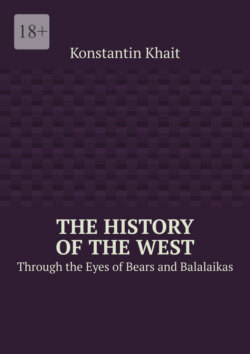The History of the West. Through the Eyes of Bears and Balalaikas

Реклама. ООО «ЛитРес», ИНН: 7719571260.
Отрывок из книги
This book was written under the significant influence of another work – George Macaulay Trevelyan’s1 “A Social History of England,” where the author attempted to move away from detailed descriptions of political events and historical figures in favor of a deep analysis of the transformation of social relations. After all, what does a traditional history textbook represent? Kings, wars, revolutions, and again kings. Dates, dates, dates. Names and again dates. Which are impossible to remember and behind which the understanding of what really happened in the world at that time is erased.
You can’t completely get rid of kings and wars, after all, they were the ones who determined the course of the historical process, creating this or that reality over many centuries. And yet, in my deep conviction, the main thing is not the names and events; they are merely hooks, markers that allow us to tie together the chronological sequence of facts, but rather the changes that occurred in a particular historical era.
.....
From a universal human perspective, everything is quite ambiguous. The death of tens of millions of people in a short period, particularly in the most developed and civilized countries at that time, sharply increased the empirical value of life. Alongside the widespread adoption of hygiene and antibiotics11, which drastically reduced child mortality and mortality in general, society’s reflection on war and its consequences led to people valuing their lives incomparably higher than before, regardless of objective criteria of their own success, usefulness, and prospects. Throughout most of human history, life was valued based on the logic of an individual’s use to society: a young person was worth more than an old one unless the old person possessed some unique knowledge and skills, a man was more valuable than a woman, the healthy were more important than the sick, and a general or nobleman was incomparably more significant than a common soldier. This kind of “rational” interpretation persisted even in wartime: it was considered a valor for a soldier to shield a general from a bullet, but a general covering soldiers under fire would be considered at least an idiot.
Fascism, as a doctrine of innate inequality or rather the unequal value of people, made such an indelible impression on humanity that, in response, a whole new legal theory emerged – the doctrine of human rights12. Rights that stem not from any merits but from the very fact of existence, and even more strongly, the assertion of the equality of these rights regardless of what a particular person represents. This doctrine, with few exceptions, has become the norm in our time and, in turn, has generated a whole set of consequences, both positive and negative. Among the first is the rejection from large-scale wars and a general decrease in the role of force in resolving conflicts: let’s not forget that even by the beginning of the 20th century, war as a means of settling political problems was considered a quite acceptable tool. The role of various forms of discrimination has sharply decreased: being Black, Indian, homosexual, or a woman no longer means being permanently in a disadvantaged position. The number of social elevators has increased immeasurably, even in traditionally “right-wing” countries such as the USA and the UK, being born into a poor family without titles and status is no longer a lifelong sentence.
.....